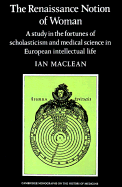 The Renaissance Notion of Woman
The Renaissance Notion of Woman 2 - Theology, mystical and occult writings
Published online by Cambridge University Press: 01 June 2011
Summary
2.1.1 It is convenient to examine Renaissance attitudes to woman in theology and mystical writing principally in the light of scholasticism. There are several reasons for doing this: the problems considered and the methods of biblical analysis remain essentially the same for scholastics and Renaissance theologians alike; the influence of the Fathers is strong in both Catholic and reformed writing; furthermore, the scholastics' practice of drawing comparisons with Roman Law, Aristotelian medicine and ethics is continued in the Renaissance. There is no need for the purposes of this study to distinguish between systematic theology (strongly influenced, even in the case of Lutherans, by Aquinas) and biblical commentary, practised widely by theologians of all persuasions. It might be said that post-Tridentine Catholic commentators were more traditional in approach, whereas reformers were more insistent on the ‘claritas Scripturae’, and more concerned with achieving commonsense explanations of obscurities and plain exegesis for the widest possible public, but this is true only in the most general terms. A small difference between Catholic and reformed writers may be discerned by the latters' exclusion from the canon of apocryphal (deuterocanonical) books, especially Ecclesiasticus, which contains much material about women; but this difference is not sufficient to create a deep division of approach. For both Catholic and reformed theologians, the habit of total recuperation of the text (that is, the desire to make every statement fit into a coherent scheme) remains the same.
- Type
- Chapter
- Information
- The Renaissance Notion of WomanA Study in the Fortunes of Scholasticism and Medical Science in European Intellectual Life, pp. 6 - 27Publisher: Cambridge University PressPrint publication year: 1980


